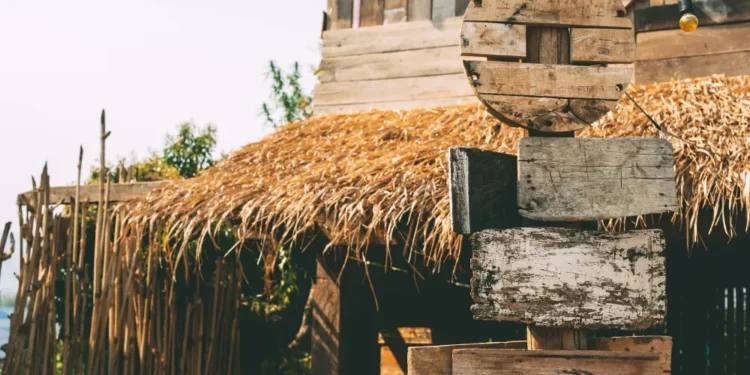The appeal of organic substances has long been evident in building construction and gardening. They give a place of character and genuineness, which fosters a welcoming and peaceful atmosphere. Thatch, a historical substance used for roofing and covering composed of vegetative fibres, is an example of something that has endured the test of time. A more recent option, fibre thatch, offers an identical aesthetic appeal and benefits. Thus, it won’t be wrong if we give this credit to technological developments. This article examines and explores the composition, installation method, benefits, and applications of fiber thatch information to provide comprehensive details. Here we start a complete Guide about fiber thatch information.
What Do You Understand By Fiber Thatch?
A basic introduction to fiber thatch information is that it is an artificial, human-made or synthetic fibre used as roofing material designed to act naturally in terms of functionality and physical appearance, but made up of synthetic fibres rather than raw materials like straw, reeds, or palm leaves. It is frequently used in buildings to give roofs, gazebos, tiki huts, and other structures a tropical or rustic appearance.
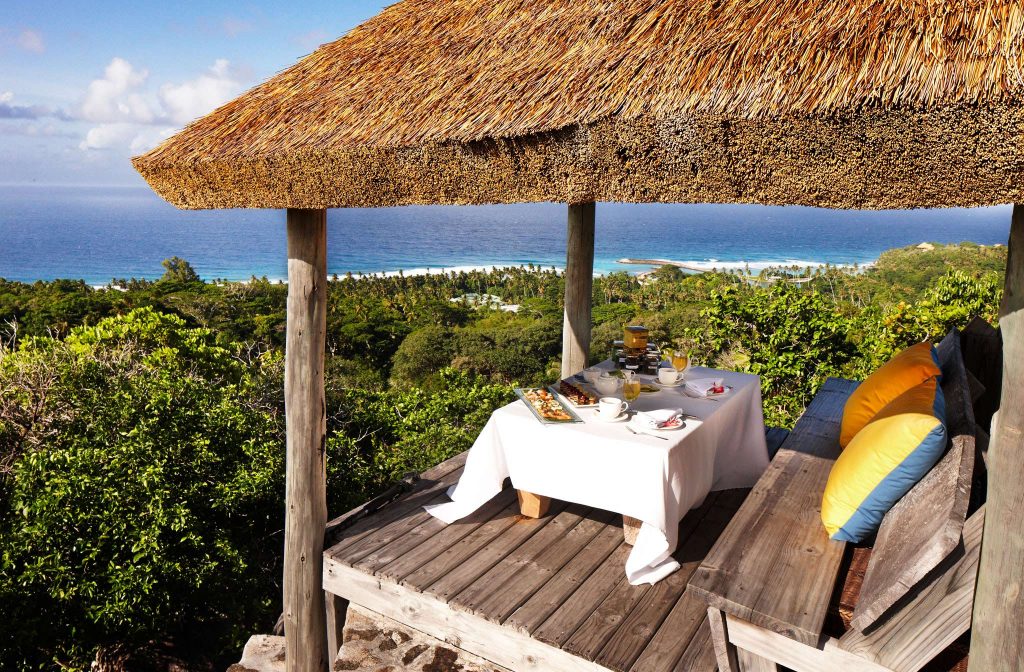
Composition
High-density polyethylene (HDPE) or polypropylene (PP) are two examples of superior synthetic compounds frequently used to make fibre thatch. Fibre thatch is a long-lasting substitute for natural thatch since its components are vital, UV-resistant, and capable of withstanding a variety of environmental situations. Through this, we came to know about fiber thatch information.
Comparison Between Synthetic Thatch And Fiber Thatch
We can compare synthetic and natural thatch based on the fiber thatch information we have. To know its practical implementation, let’s discuss some major points below. Synthetic thatch and fiber thatch information are two alternative roofing materials that can be used to achieve a thatched roof appearance. Here’s a comparison between the two:
-
Material Composition:
- Synthetic Thatch: Synthetic thatch is typically made from high-quality PVC or polyethylene materials. It is designed to mimic the natural look and texture of traditional thatch.
- Fiber Thatch: Fiber thatch is made from natural or synthetic fibers such as palm leaves, reeds, grass, or a combination of these materials. It provides a more authentic and organic appearance compared to synthetic thatch.
-
Durability and Longevity:
- Synthetic Thatch: Synthetic thatch is highly durable and resistant to weathering, UV rays, and insect damage. It can last for several decades without significant deterioration.
- Fiber Thatch: The lifespan of fiber thatch can vary depending on the specific materials used. Natural fiber thatch tends to have a shorter lifespan and may require regular maintenance to prevent decay, mold, or insect infestation.
-
Maintenance:
- Synthetic Thatch: Synthetic thatch requires minimal maintenance. It is easy to clean and does not need to be treated for pests or fungi.
- Fiber Thatch: Fiber thatch may require periodic maintenance such as cleaning, resealing, or applying protective treatments to prevent rot, mold, or insect issues. It may also need occasional replacement or repair of damaged sections.
-
Fire Resistance:
- Synthetic Thatch: Fiber thatch information, Synthetic thatch is typically fire-resistant and meets fire safety regulations. It has a higher fire resistance compared to natural fiber.
- Fiber Thatch: Natural fiber thatch is flammable and can be a fire hazard if not properly treated with fire retardant coatings. Synthetic fiber thatch may have better fire resistance properties.
When choosing between synthetic thatch and fiber thatch, Fiber thatch information it is important to consider factors such as budget, desired aesthetics, durability, maintenance requirements, fire safety, and local building regulations. Assessing these factors will help determine which option is more suitable for your specific needs.
Lifespan And Solidity
One of the vital fibers that thatch information is that thatch is made from synthetic fibres, and fibre thatch tends to be more resilient and permanent than natural thatch. It is made to withstand UV rays, mould, vermin, and rot, maintaining its structural strength for a long time. On the other hand, natural thatch is vulnerable to rot, weathering, and infestations of pests, necessitating more frequent upkeep and, eventually, replacement.
Resistance To Fire
Moreover, by gathering the fiber thatch information, we came to know that fibre thatch is not flammable. It can help lessen the likelihood of fires spreading. Compared to natural thatch, which is highly combustible, it frequently includes fire-retardant characteristics, making it a safer option.
Fiber thatch, particularly natural fiber thatch, is not inherently fire-resistant. However, it can be treated with fire retardant coatings to improve its fire resistance. Fire retardant treatments are typically applied to the surface of the thatch, creating a barrier that slows down the spread of flames and reduces the risk of ignition.
When fiber thatch is properly treated with fire retardants, it can achieve a certain level of fire resistance. The effectiveness of the treatment and the resulting fire resistance can vary depending on the specific materials used, the application technique, and the quality of the fire retardant product.
It’s important to note that even with fire retardant treatments, fiber thatch is not completely fireproof. It is still susceptible to damage and combustion under intense heat or prolonged exposure to flames. Therefore, it’s essential to follow fire safety regulations and take precautions to minimize the risk of fire, such as keeping open flames, sparks, and heat sources away from the thatched area.
If you are considering using fiber thatch for roofing or other applications, it is advisable to consult with professionals who specialize in thatched roof construction or fire safety to ensure compliance with local regulations and to obtain guidance on appropriate fire retardant treatments and maintenance practices.
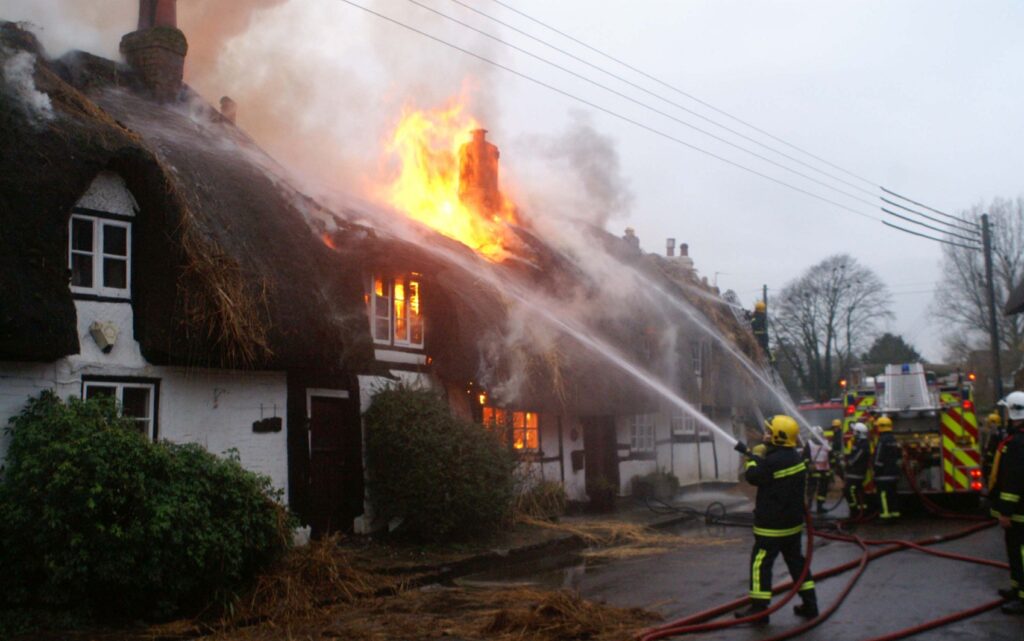
Prerequisites For Upkeep
Comparatively speaking, fiber thatch information takes a lot less upkeep than natural thatch. Due to fire risks or deterioration, it does not require routine replacement. On the other hand, natural thatch needs routine examination, repair, and replacement of broken parts to keep its strength and aesthetic quality.
Beauty And Personalization
The appearance of fibre and natural thatch is both rural and tropical. Although many different colours, textures, and styles are available, fiber thatch information allows for more creative versatility. It is adaptable to particular architectural preferences. The colour and design options for natural thatch may be limited, even though it offers an authentic appearance.
Impact On The Environment
Natural thatch is a roof covering favourable to the environment because it is created from sustainable resources like straw or palm fronds. At the end of its useful life, it can be composted with little harm to the ecosystem. Since synthetic fibre thatch is not recyclable, its manufacture and disposal could result in a more significant impact on the environment.
Fiber thatch, when managed and sourced responsibly, can have a positive impact on the environment. The use of renewable and sustainable materials, such as palm leaves, reeds, or grass, reduces dependence on non-renewable resources. Additionally, natural fiber thatch is biodegradable, ensuring minimal long-term waste and pollution. The production of fiber thatch typically requires fewer resources compared to synthetic roofing materials, resulting in reduced energy consumption and lower carbon emissions. Sustainable harvesting practices and responsible supply chains further contribute to the environmental benefits.
However, it’s important to consider the potential impact of chemical treatments and choose non-toxic options that minimize harm to human health and ecosystems. By prioritizing sustainable sourcing, responsible manufacturing processes, and considering the longevity of the product, fiber thatch information can be an environmentally friendly roofing option that blends aesthetics with eco-consciousness.
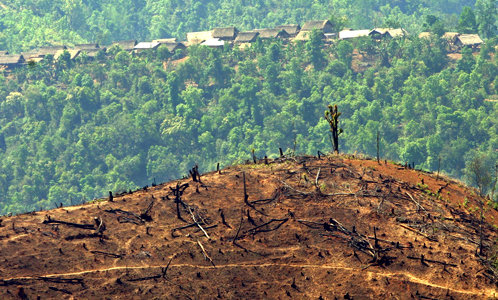
In Term Of Cost
Compared with natural bamboo, the initial cost of fibre thatch is often higher. Nevertheless, fibre thatch can end up being more affordable in the long run compared to organic thatch, which comes with upkeep and repair costs.
In the following sections, we will additionally discuss fiber thatch information. Moreover, we will also discuss its application in future headings, so remember to read forthcoming titles.
Practical Implementation (Application)
Given its remarkable characteristics and appealing appearance, fibre thatch is used in various construction endeavours. In this section, we are examining the practical application. So here is some vital fiber thatch information.
Fiber thatch information has found numerous practical applications across various industries and settings. One prominent implementation is in the construction of thatched roofs, which brings a distinctive and enchanting aesthetic to residential homes, resorts, hotels, and restaurants. These roofs exude a rustic charm and create an inviting atmosphere, transporting occupants to a tranquil and idyllic setting. Additionally, fiber thatch is often employed in the construction of gazebos, pavilions, and outdoor structures, providing shaded areas for relaxation and social gatherings. The natural and organic appearance of fiber thatch blends seamlessly with surrounding landscapes, making it an excellent choice for gardens, parks, and recreational spaces.
Moreover, in theme parks, water parks, and entertainment venues, fiber thatch is frequently used to create immersive environments that transport visitors to exotic locales. Thatched huts, tiki bars, and other tropical-themed structures add an authentic touch, enhancing the overall ambiance and contributing to an unforgettable experience. With its versatility, durability, and timeless appeal, fiber thatch continues to be a sought-after material in various practical applications, adding beauty, character, and a touch of traditional elegance to a wide range of spaces.
Roofs In Homes
According to fiber thatch information, it is a distinctive and eye-catching replacement for conventional roofing materials; fibre thatch is being employed more and more for residential roofing. A sense of peace and escape is produced by its natural appearance, which is suggestive of other places. Fibre thatch roofs add a bit of class and a touch of the tropics to any home, whether a seaside villa or a country hamlet. Fibre thatch offers enduring protection with a low maintenance requirement thanks to its outstanding resilience and resistance to environmental influences. Thus, adding fibre thatch can make Residential roofs more enticing and environmentally friendly.
Commercial Facilities
With the fiber thatch information, we also came et know that fibre thatch is used in food outlets, accommodations, and resorts that frequently look for innovative methods to design appealing and memorable places. Fibre thatch provides the ideal option by incorporating a touch of classic elegance and exotic appeal. Fibre thatch may transform a space into a tropical paradise, giving patrons an immersive experience, distinguishing a place from others.
Fibre thatch roofs and coverings provide a laid-back and welcoming ambience in everything from tiki bars to outdoor dining places. Using fiber thatch information guides, companies can improve their corporate identification, attract clients, and leave a lasting impression.
Ambient Architecture
Numerous exterior buildings are built with fibre thatch, which has advantages from an aesthetic and functional standpoint.
Having clear fiber thatch information helps in making a decision to add fiber thatch roofs, gazebos, cabanas, and pergolas can seem fascinating. Fibre thatch blends seamlessly with the outside thanks to its natural appearance, which complements the surroundings. The spaces created by these buildings are perfect for recreational parties, entertainment, and leisure.
Fibre thatch maintains the longevity of outdoor structures with its remarkable UV resistance and toughness, thereby rendering them a good investment for individuals and companies. But you have good information about fibre thatch.
Hotels And Amusement Parks
Fiber thatch information also tells that their visitors, theme parks, and resorts attempt to offer immersive experiences that are frequently based on particular cultures or settings. Fibre thatch is a great way to recreate the feel of tropical locations, ethnic settlements, or even prehistoric civilizations. Fibre thatch may give these recreational areas a sense of genuineness and charm by serving as roof decorations for huts and shelters, and ornamental accents on rides and attractions. Fibre thatch offers a safe and enduring choice for the challenging surroundings of vacation destinations and parks due to its ability to resist fire and capacity to sustain substantial foot traffic.
Applications In Landscape Design And Decoration
By fiber thatch information, we came to know that Fiber thatch can be utilized for various ornamental and landscaping tasks in addition to roofs. It can cover walls, resulting in visually attractive facades that integrate seamlessly with the environment. Fibre thatch can highlight exterior elements like gushing waters, architecture beside pools, or garden structures. Because of its adaptability, fibre thatch may be incorporated into unique forms that perfectly express the character of a particular environment. Fibre thatch may bring natural splendour and intrigue to any space, whether a Mediterranean-style courtyard, a Zen garden, or a tropical sanctuary.
In addition, we learned how fiber thatch information is essential for us in terms of practical aspects; it enables how it is for us.
Some Benefits Of Fiber Thatch
Based on fiber thatch information, let’s discuss some advantages.
By deciphering the fiber thatch information, we recognized that the incredible resilience and lifespan of fibrous thatch are its main features. Unlike natural thatch, which can be vulnerable to mould growth, pest infestations, and decay, fibre thatch is highly resistant to external influences.
Its synthetic makeup, frequently strengthened with UV inhibitors and flame retardants, ensures it can endure extreme weather, such as torrential downpours, gusting winds, and even fire. Moreover, Fibre thatch is made to last for many years, minimizing the requirement for frequent maintenance or replacement and ultimately offering a more affordable option.
Additionally, the resistance to UV radiation damage is a unique feature of fibre thatch. Fibre thatch may maintain its vivid colour and structural integrity for an extended period when not subjected to strong sunlight by adding UV inhibitors throughout manufacturing. This UV resistance keeps the substance from fading, changing colour, or crumbling. Thus making fibre thatch the perfect material for outdoor projects, guaranteeing that its visual appeal will endure regardless of climate factors or where it is.
Another significant advantage of fibre thatch is its design flexibility. To accommodate various designs and aesthetic preferences, it can be modified. Fibre thatch beautifully mixes with multiple styles, bringing unmistakable beauty and ageless elegance, whether used for residential roofs, commercial buildings, or outdoor structures. Because of the material’s adaptability, architects and designers can explore inventive ideas and blend fibre thatch into one-of-a-kind tropical hideaways, rustic retreats, or cultural enclaves, is made possible by this versatility possible. Eye-catching creations.
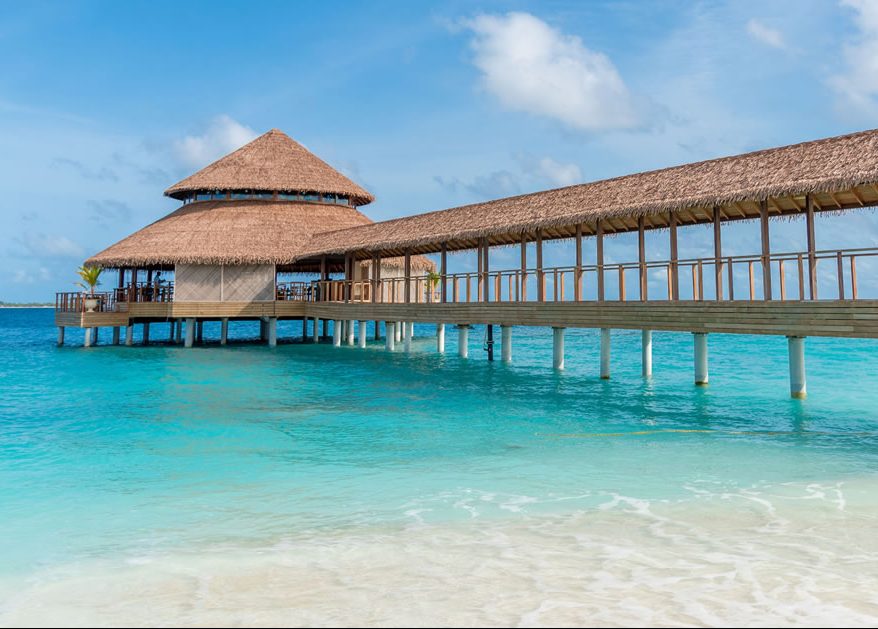
Best Type Of Fiber Thatch
The following materials, which we are going to discuss in the next paragraphs, are the best types of fibre thatch and were created to imitate the appearance and texture of natural thatch. We can select this only by reading the whole article on Information about fibre thatch.
Moreover, the standard material for many construction endeavours is synthetic palm thatch. It’s made of artificial fibres designed to resemble real palm leaves look and feel. Synthetic palm thatch’s durability, fire resistance, and UV resistance are all quite good.
Moreover, this type of fibre thatch can be used for personal and business purposes because it is made to withstand extreme weather. Synthetic palm thatch is a sought-after choice among resorts, tiki bars, and recreational constructions because it has a realistic palm leaf look and evokes a tropical feeling.
To mimic the appearance of conventional African thatch roofs, synthetic African Cape Reed thatch is used. It faithfully replicates the natural appearance of African Cape Reed, which is recognized for its unusual texture and exquisite appearance. The greater strength, fire resistance, and UV resistance of synthetic African Cape Reed thatch are offered. It offers a durable roofing solution while withstanding the most extreme weather conditions. Using this fibre thatch frequently gives accommodations, lodges, and outdoor gathering places a luxurious African feel.
Conclusion
In a nutshell, fibre thatch is an artificial roof covering that performs and looks like natural thatch. Compared to natural thatch, it requires less upkeep and is more resilient to pests and UV rays. Residential and commercial structures, hotels, theme parks, and outdoor spaces utilize fibre thatch. It offers adaptability in design, fire resistance, and durable performance. While fibre thatch has a longer lifespan and perhaps has a higher environmental impact than natural, the former is more environmentally friendly. Fibre thatch offers a visually attractive and environmentally friendly roofing choice for various uses.


